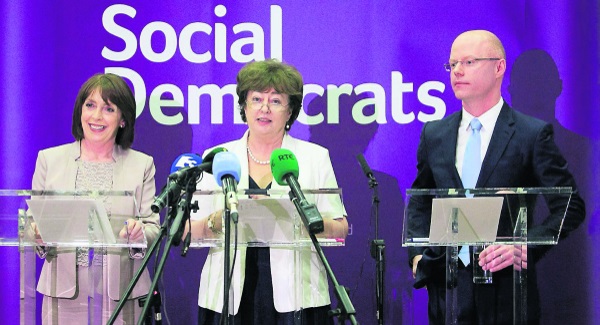It’s hard to believe it is just over 6 months ago that Stephen Donnelly was hoisted to roaring electoral success on foot of 14,348 first preference votes in his home constituency of Wicklow. He was, until last week, one of the three joint members of the emerging force in Ireland, the Social Democrats.
In the new environment that is the so-called “New Politics”, many predicted a rapid rise to success for the burgeoning left wing party.
However on foot of recent events, it is not unthinkable to question the survival of the Social Democrats as a viable political entity in the Dáil. Stephen Donnelly’s resignation has hit at the core of the party’s establishment and has dealt a firm blow to left wing politics as a whole in the country.
“It is a fact that some partnerships, in every walk of life, simply don’t work no matter how hard all of the parties to that partnership try to make it succeed”, Donnelly said in his resignation statement. But that said, much has left to be answered as to why such a situation arose that one of the joint leaders would cut all ties with the party he helped establish.
Tension, sources within the party say, have been growing since the aftermath of the election.
Source of tension
The Social Democrats had not made their pre-election targets but nonetheless they returned their three sitting TDs. Comparatively speaking, when the Social Democrats results are weighed up against other left wing parties such as Sinn Féin, who failed to capitalise on predicted gains, and Labour who faced almost utter annihilation, the party all in all didn’t have too bad of a showing.
Indeed, Fine Gael’s government formation presented a perfect opportunity for the Social Democrat’s to come into the fore, and even potentially sneak a few ministerial roles and a role in government.
This is exactly what Donnelly himself was saying. The problem arose when fellow leaders, Catherine Murphy and Roisin Shorthall were not singing off the same hymn-sheet. Tensions in the party have been growing ever since, with the final straw coming over a disagreement on the Social Democrats stance on the Apple controversy.
But the biggest question of all is not in fact why the split and snap resignation occurred, but rather the impact it will have on future of liberal and leftist politics in the country in years to come. The Labour Party, Ireland’s oldest political party, were decimated in the last election and have been left fighting for their lives.
Many tipped this to be the opportunity for the Social Democrats to flourish and potentially upstage Labour as the dominant force for left-wing Ireland where so many others before them had failed. The loss of key player such as Stephen Donnelly puts this firmly out of reach in the near future, if not indeed outside of the realms of plausibility for electoral generations to come.
Political compromise
That said, Donnelly’s resignation underscores a recurring dichotomy in Irish politics. Both on the left and on the right, politics of late has been caught in a grappling struggle between idealism and pragmatism. Irish Labour who until 2011 at least, were the standard-bearer for working-class voters in the country.
The decision to go into coalition with Fine Gael 5 years ago, was an attempt to bring their ideals to the table, but alas coalition is never that easy. Governance, most certainly in proportional representation systems such as Ireland, requires compromise and collaboration, which ultimately requires a bit of pragmatism.
But this comes at a steep price. Just as Irish Labour learned this year, and the Liberal Democrats in the UK realised in 2015, and the Irish Greens before them in 2011, the electorate is rarely sympathetic to parties who compromise on their ideals to play a role in government.
Stephen Donnelly’s desire to open negotiations with Fine Gael for a coalition was a perfect example of political pragmatism. Shorthall and Murphy’s desire to stay on the backbenches and develop themselves as a voice of opposition is a case in hand example of idealism.
However idealism does not necessarily get you influence in politics, and being an idealistic opposition politician, does not make for a very commendable career resume. The decision between “sticking to your guns” or “having a shot” at leadership is not an easy one.
Rise of the Independents
That being said, the fact that Donnelly has now splintered the one party that many people thought had the best shot at bringing the ideals of social democracy to the table in Ireland does not bode easily. Donnelly has in effect set a ticking time bomb on the self-implosion of the party he helped create.
One could dismiss this as a case of bitter infighting and one politician cutting off his nose to spite his face. But that may well not be the case at all.
In the current political environment, there is no better time to be an independent politician. One only has to cast their mind back five years ago to when the once prominent Fine Gael TD Denis Naughton cut ties with his party over a disagreement on Roscommon Hospital. For his penance he did spend 5 years on the sidelines, but now he is one of the celebrated independent ministers in Dáil ÉIreann.
One would certainly not be remiss for questioning whether Donnelly has similar motivations. Indeed, the rumoured resignation of John Halligan from the cabinet makes such a theory almost too convenient.
This may well not be the case, only time will tell whether history will cast Stephen Donnelly as a pragmatist and true governor destined for power, or a politician who imploded his own party and their vision for Ireland in pursuit of a hopeless cause.
In the world of so-called new politics, the ultimate playing field of negotiation and political parlance, our guess is as good as anyone else’s.







